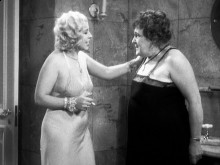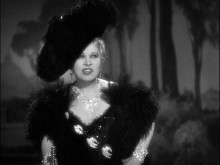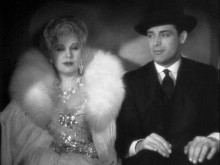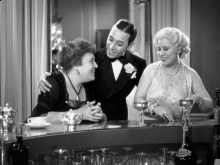August 17 is Mae West’s birthday—her 117th to be exact—and to mark that occasion the Asheville Film Society is showing the legendary screen icon’s first two films—Archie Mayo’s Night After Night (1932) and Lowell Sherman’s She Done Him Wrong (1933). The first film—and the lesser of the two—introduced West to the movie-going public, who had never seen or heard anything quite like her. It was inevitable that she’d soon have a film of her own, so her stage play Diamond Lil was turned into She Done Him Wrong (the title change was for censorship reasons) where the full power of West was unleashed on a movie-going world eager to embrace it.

On its own merits, Night After Night is little more than a slick B picture that exists mostly to promote George Raft, who had shot to stardom earlier that year in Howard Hawks’ Scarface. It’s a nice looking—if rather silly and sexist—little picture that’s of some minor interest for its soundtrack, which consists of fairly hot jazz dance-band arrangements of songs from other Paramount films of the era. “Everyone Says I Love You” from Horse Feathers (1932) gets heavy play as do “You Little So and So” from Blonde Venus (1932) and “Isn’t It Romantic?,” “Mimi” and “Love Me Tonight” from Love Me Tonight (1932). (Considering some of the sets are recycled from Love Me Tonight, the last named is an especially nice fit.)

The movie doesn’t become anything special till a little past the halfway mark when Mae West enters the scene as the magnificently amoral and outspoken Maudie Triplet. She appears in a cloud of men and sashays into Raft’s speakeasy in complete control of the moment, pausing only to check her wrap and deliver her first great line when the girl in the cloakroom enthuses, “Goodness! What beautiful diamonds!” Without a pause, Maudie responds, “Goodness had nothing to do with it, dearie,” and sails into the nightclub—where she proceeds to own the film.
What’s surprising is how very little West has to do in the film. Her scenes with the magnificent Alison Skipworth—especially the one where Skipworth mistakes Maudie for an outright prostitute—are wonderful, but they almost exist outside the film and have nothing to do with its actual plot. Yet these few scenes are what everyone remembers because they’re what turn a stylish, but otherwise indifferent movie into something special—something worth remembering.

West’s first starring film She Done Him Wrong is another matter altogether. It’s full-fledged Mae West and in many ways her best film. It’s also the film that saved Paramount from bankruptcy—and made her the highest paid movie star of the day. It’s also a film that no one thought—at first—could even be made. Even in those pre-production code days, the notoriety of West’s show Diamond Lil had put it on a list of titles that were considered improper and not to be filmed. A little research, however, uncovered the fact that it wasn’t the material that was out of bounds, only the notorious title and the character name. So it became She Done Him Wrong and West became Lady Lou and the problem was solved.
It’s almost forgotten today, but Lowell Sherman was not only a popular actor, but a director of some note in the early sound era. Films like The Royal Bed (1931) established him as a kind of lightweight Ernst Lubitsch, and he brought something of that touch to She Done Him Wrong, while carefully not undercutting West’s essential earthiness. It is, after all, truly her film more than the director’s. And everything about it is indeed hers.

She Done Him Wrong is the stuff of legend. It’s the film where she scandalized the world by singing “I Wonder Where My Easy Rider’s Gone” and put her stamp on “Frankie and Johnny” (even if she doesn’t get to sing the whole thing). It’s the film where she brought Paramount contract player Cary Grant to the attention of the movie-going world by giving him his best role to date—in one of the most popular films of the year. It’s delightfully pre-code in the way she bring sex out into the open and pokes fun at it—and makes no bones about her own appetite for it. It also allows her to more or less get away with murder. (Yeah, it’s self-defense, but it’s obvious that she’s not even going to be arrested for it.) But one thing it isn’t is the film where she says, “Come up and see me some time.” She does ask Cary Grant, “Why don’t ya’ come up sometime and see me?” and offers, “Come up, I’ll tell your fortune,” but that’s as close as it gets—at least in this film.



If you don’t think Mae West was one of the most attractive women of the 20th century, something is wrong with you. Deeply wrong.
http://www.youtube.com/watch?v=5L0eJp7V2Zs
Ssssiizzlin!
If you don’t think Mae West was one of the most attractive women of the 20th century, something is wrong with you. Deeply wrong.
Regardless of my stance, some would agree that there’s something deeply wrong with me.
Well that was a fine treat. I remember seeing a print interview on Mae West back in the late 60s. I simply didn’t get what made her special. It’s really too bad that I never saw her in action, till now. I could have used her as a role model for unbrideled raw lustiness. No wonder the code came to be. Mae West had the on screen persona that threatened to turn all women who saw her into lusty hussies……mores the pity that the “code” prevailed.
It’s really too bad that I never saw her in action, till now. I could have used her as a role model for unbrideled raw lustiness.
It’s never too late to start.